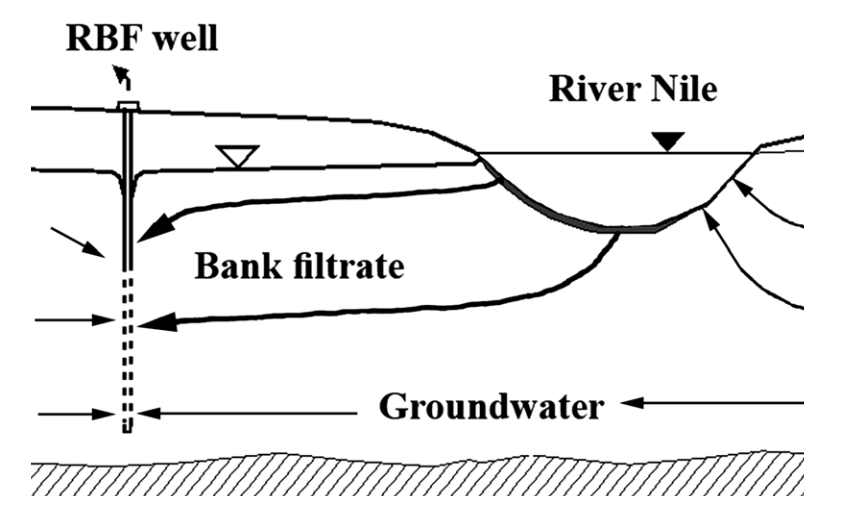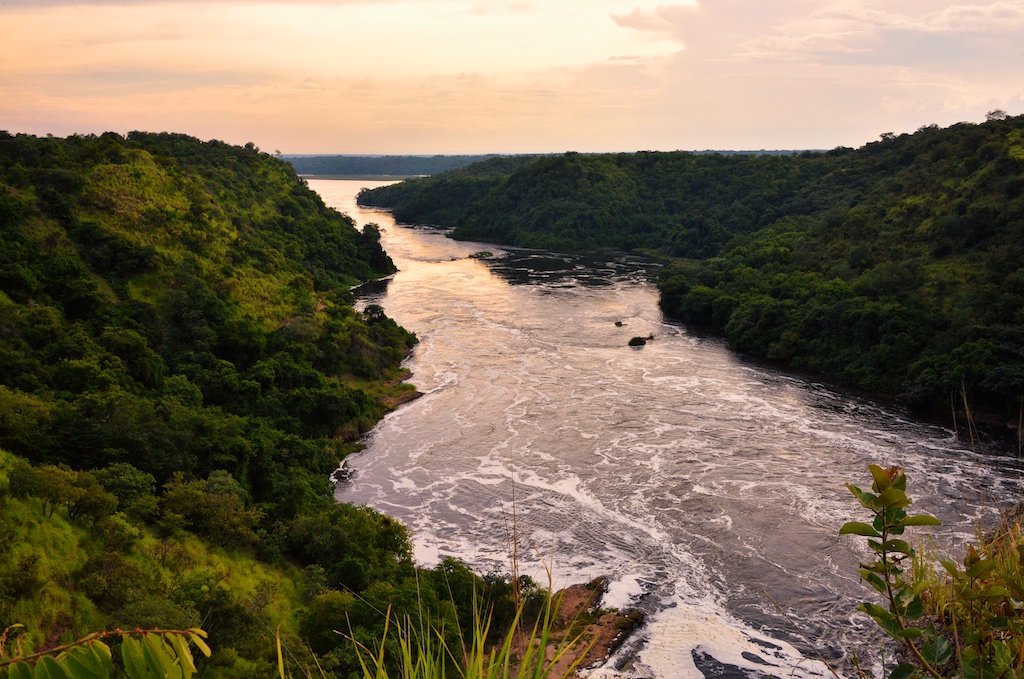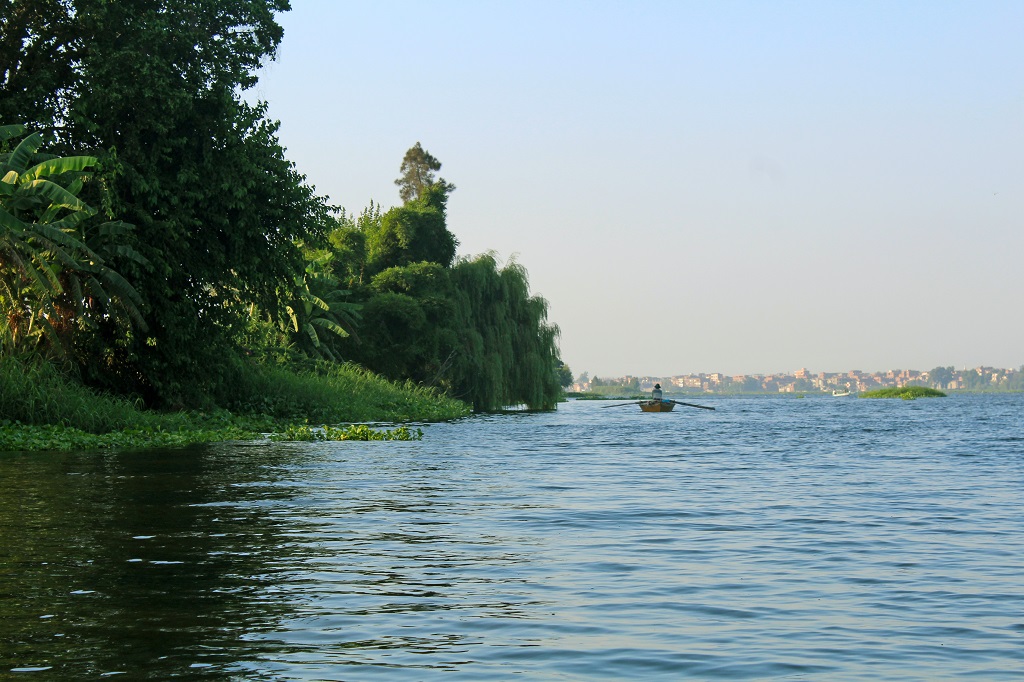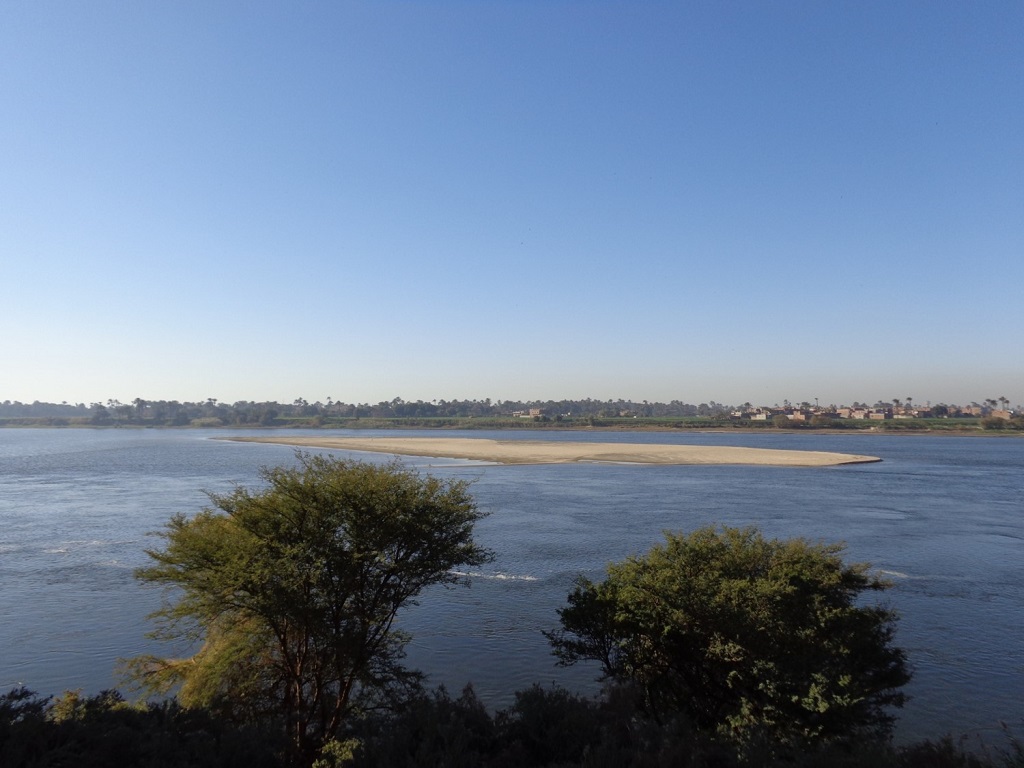By: Moslem Ali
Cairo - Mubasher: Drinking water supply in Egypt is almost entirely dependent on the Nile, but the river that on its banks the greatest ancient civilization was born is facing many environmental challenges nowadays.
Nearly 92% of drinking water in Egypt comes from the Nile, but nearly 10% of the Egyptian population does not have a sustainable access to safe clean water, despite the huge investments that were pumped in the Egyptian water sector in recent decades.
Scientific methods can play a vital rule in dealing with pollution and other threats facing water security in Egypt, especially a simple technique known as Riverbank Filtration (RBF).
Riverbank Filtration is a low-cost and environmentally-friendly alternative for conventional water treatment technologies.
Egyptian scientist Dr. Kamal Ouda Ghodeif, a pioneer in bringing RBF to Egypt, believes it is a cheap natural technique that could help provide clean drinking water for millions of Egyptians.
In an interview with Mubasher he explained that RBF is an effective method that lets soil layers do most of the work in filtrating and cleaning water, through a series of natural biological and chemical processes, before water is drawn off in nearby extraction wells, in an application of communicating vessels and hydraulics.

The soil provides a natural barrier that filters water from suspended solids and particles, biodegradable and absorbable compounds, heavy metals, and pathogens in a process in which water is also purified from other pollutants such as bacteria, viruses, parasites, algae, and protozoa, as living organisms in the soil feed on these microbes, and most of what remains does not survive the long travel time between the riverbank and the well, which usually takes more than 30 days.
The professor of hydrogeology and water treatment in Suez Canal University explained that not only is Riverbank Filtration a cheap green technique for water treatment, but that it is also ideal to deal with leakage of oil or chemical substances, as well as crises and emergencies such as floods.
“RBF can confront the problems that conventional treatment techniques in Egypt are currently facing. These problems include increasing contaminants loads at the source, closure of plants during shock loads from flash floods, accidents and contaminant spills, seasonal algae blooms and their toxins and disposal of treatment plants backwash wastes,” according to a research paper that Dr. Ghodeif co-authored that was published in the Environmental Earth Sciences Journal by Springer.
Although the Aswan High Dam has protected Egypt from flooding, allowing a better control of water flow through the river, flash floods and rainfall in Upper Egypt has previously brought high levels of turbidity to the Nile, as water collects in desert valleys and then drains into the river. This has previously caused a shutdown in some areas of conventional water stations not capable of dealing with the high contamination that occurs in such cases, he added.
Professor Ghodeif also noted that the use of RBF units also protects conventional water treatment stations from algal blooms, which lead to the clogging of filters and a reduced efficiency, without the need to use toxins that could harm the environment, or chemicals such as Alum and Chlorine that may produce harmful residues during backwashing, the process in which water is pumped back towards the source to clean the filters that unfortunately could result in polluting the river with high levels of aluminum.
“These units operate 24/7 which helps provide a sustainable clean water source that is resistance to contamination threats,” Ghodeif stressed.
The Economic Advantage
The cost of applying RBF technique is less than traditional surface water or groundwater treatment plant.
Professor Kamal Ghodeif, a holder of a PhD in Earth Sciences from Adam Mickiewicz University in Poland, elaborated on the economic factors that can support the use of the RBF technology, noting that the investment costs of Riverbank Filtration units are much cheaper when compared with the conventional stations.
The cost for an RBF unit that has a capacity of 30 liters per second ranges between EGP 200,000 and 300,000, equivalent to $11,000 - 17,000, while a conventional water treatment plant with the exact capacity would probably cost more than EGP 10 million ($57,000).
Operation and maintenance costs for Riverbank Filtration units are also a fraction when compared to the conventional stations. One person can solely operate an RBF unit, as it does not require high technology nor does it consume a lot of energy, yet it operates 24/7, Ghodeif explained.

Combating Global Warming... The Threats of Climate Change to the Nile
The Nile River is facing the threat of declining water flows due to the construction of dams in the upstream countries, with climate change doubling such a threat, as it could affect both the quantity and quality of the water in the Nile valley.
RBF units help maintain not only the quality and the temperature of the water, but it can also guarantee that water plants would sustain its supply, contrary to what would occur if the level of water in the river went below a certain level.
The World Wide Fund for Nature (WWF), the international NGO that initiated the Earth Hour movement, previously showed that the Nile is among the 10 rivers most at risk from climate change, excessive water extraction, invasive species, and pollution.
From the Banks of the Rhine to the Valley of the Nile
Riverbank Filtration is not a new invention, it was even used by Ancient Egyptian, but its development came from Germany, where it was widely used to produce clean drinking water especially from the Rhine in the late 19th Century, Ghodeif explained, adding that introducing the technique to Egypt was in fact supported by the German Egyptian Research Fund (GERF).

The application of RBF also extends to the pre-treatment of drinking water, industrial water, irrigation supplies and artificial recharge of groundwater. It contributes to reducing the depletion of groundwater in large ponds and the mitigation of groundwater with high concentrations of pollutants and arsenic, the Egyptian scientist indicated.
Seawater Desalination
When asked whether the technique can be applied in desalination, professor Kamal Ghodeif noted that RBF units can help in the pre-treatment process, which will reduce the cost of water treatment and desalination, as RBF protects and increases the longevity of reverse osmosis (RO) membranes, the most expensive component in a seawater desalination station, thus reducing costs and energy consumption.
Dr. Kamal’s research and studies have shown that beach sand filtration significantly reduces hydrophilic neutral substances such as polysaccharides and proteins with high molecular weight, and can even render pre-treatment unnecessary, as per a study published in the International Journal of Water Sciences.
The technology is already used in a desalination plant in Dahab, a town in southern Sinai.
Success Stories
There are currently about 40 Riverbank Filtration units operating around the Nile valley, with the majority concentrated in Upper Egypt, where not only there is a bigger need to provide clean drinking water, but where it is also easier to operate these units as water is less polluted than in the north.
There are 21 RBF units in Minya, four in Sohag, six in Beni Suef, and one in Deshna, Qena, according to the data of the Holding Company for Water and Wastewater (HCWW).
Meanwhile, there is only one unit in Greater Cairo in Imbaba, Giza.
Motivation and Challenges
Regarding why Egypt should increase the use of the technique, Ghodeif stressed that RBF can effectively help in disease prevention as it removes protozoa and pathogens from the river water, it also reduces the costs of water treatment, and provides high storage capacity due to the long water travel time, which also provides the first line of defense against emergencies, contamination, and leakages.
Ghodeif stressed that despite all of that, the technique is not a magic solution, and following standards and a sound scientific methodology in planning and designing these units is key to its successes and effectiveness, especially when it comes to site investigation, which he believes is the biggest challenge that determines the success of an RBF unit.
Site investigation identifies the proper distance between the well and the riverbank, as well as the depth of filter screens.
The professor of hydrogeology also noted that RBF units are not necessarily an alternative to all conventional water plants, yet it can play a huge role in increasing its efficiency, calling for integrating Riverbank Filtration in the Egyptian water management system to achieve the sector’s strategic goals of improving drinking water production, availability, and sustainability, at a high quality with both cost and waste reduction.

According to a research paper that professor Kamal Ouda Ghodeif co-wrote, RBF has been used successfully in Egypt, and when properly implemented, delivers good quality water that meets the requirements for potable supply.
However, RBF is a natural treatment step and requires thorough hydrogeological and hydrogeochemical preliminary investigations over at least a one year period at each site, as per the research published by the American Society of Civil Engineers.
Another Study published in the International Journal of Water Sciences, noted that RBF is not viable everywhere in Egypt, as the technique needs favourable hydrogeological conditions and thorough investigations.
Nonetheless, research has indicated a high potential for RBF along surface waters in the desert fringes in both the Nile valley and the delta as well as in the flood plain in the Nile valley of Upper Egypt.
Fully penetrating sections, islands and meanders of the Nile River are the best sites for RBF applications.
RBF in Egypt is site-specific and every new site requires detail hydrogeological investigations, the research pointed.
The professor is strongly warning that failing to meet such requirements could lead to losing the economic and environmental benefits of this simple yet effective natural technique that he himself has been researching for almost 20 years now. Kamal Ghodeif dreams his country would use Riverbank Filtration in the best way possible, so that it can provide clean drinking water to millions of Egyptian families, and protect the great Nile River.
This article is part of the Science Journalism Project “Schreiben über Wissenschaft - الكتابة في المجال العلمي” of the Goethe-Institut and the German Academic Exchange Service (DAAD), supported by the German Federal Foreign Office. More information can be found at https://www.goethe.de/egypt.



